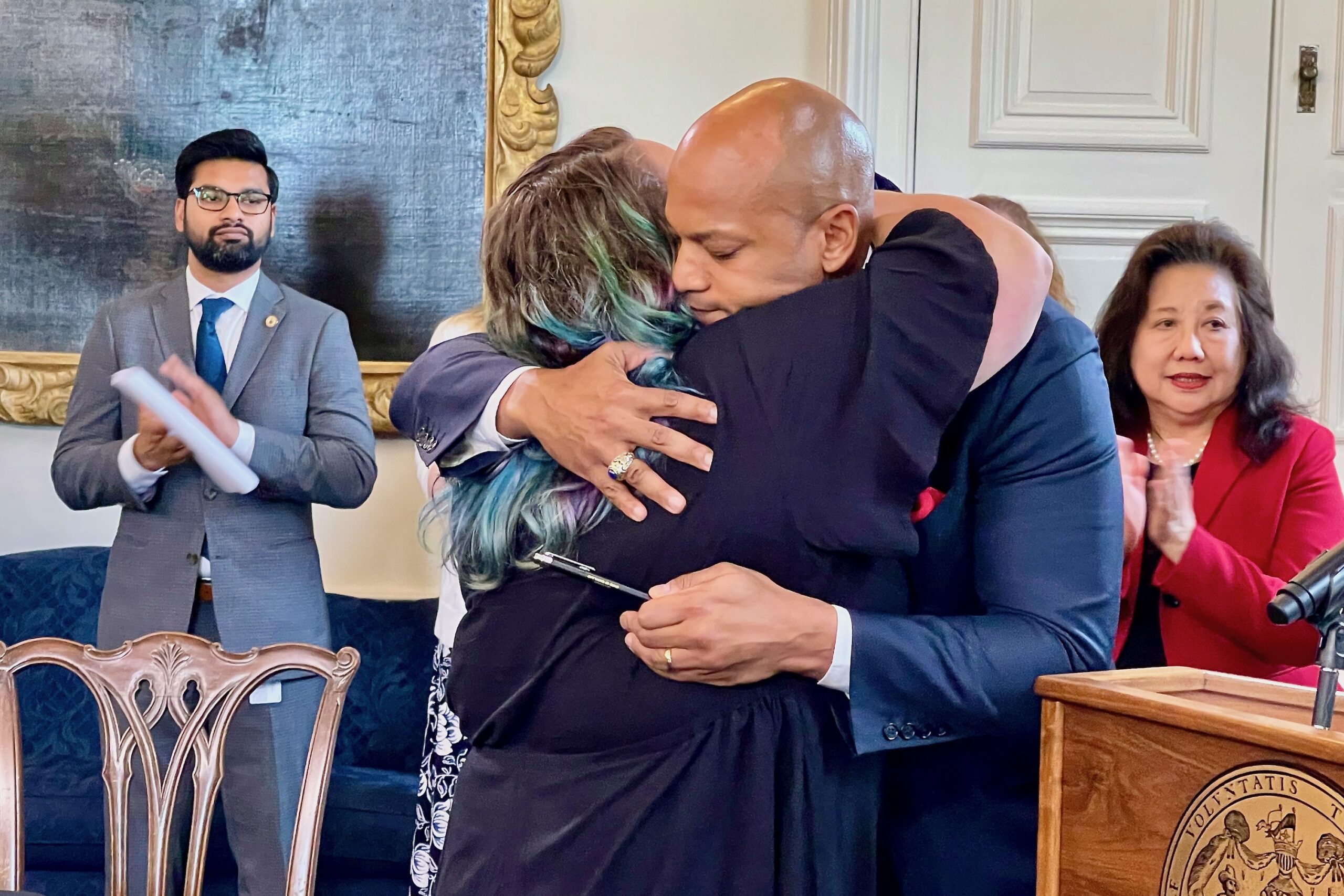Moore signs gun bills, measures that bolster responsibilities of the Attorney General’s office

Lawmakers and advocates who pushed for stronger gun control measures in the recent General Assembly session saw their work come to fruition as Gov. Wes Moore (D) signed more than a dozen public safety bills into law Tuesday.
One of the biggest measures discussed during this year’s legislative session was Senate Bill 1 — led by Sen. Jeff Waldstreicher (D-Montgomery) — which seeks to prohibit the open carry of guns in the state and restrict where firearms can be carried, including at locations such as preschools, government buildings and polling places.
The legislation exempts the wear and carry permit law for individuals with specific jobs, such as correctional officers, employees of armored car companies and security guards.
Lawmakers debated the legislation after the U.S. Supreme Court decision last year in the New York State Rifle and Pistol Association v. Bruen case challenging New York law. The Bruen decision allows Maryland to assess “sensitive places” where firearms can be carried.
The bill Moore signed Tuesday will go into effect Oct. 1.
A similar gun measure slated to take effect on the same day this year is House Bill 824, which establishes additional provisions on who can possess firearms – including raising the age for a legal purchase from “an adult” to 21.
There are other new restrictions as well. For instance, a person currently serving probation for driving under the influence cannot obtain a wear and carry permit. Other restrictions extend to a person who is on supervised probation for violating a protective order, a fugitive from justice, and an individual who is addicted to a controlled dangerous substance or “is a habitual user.”
“We clarified and we strengthened the objective rules because that’s what the Supreme Court wants,” Del. Luke Clippinger (D-Baltimore City), who chairs the House Judiciary Committee and helped lead the effort to approve various gun bills, said in an interview this week. “[The Supreme Court justices] don’t want subjective rules anymore. They want objective rules. I think they’re going to fit under Bruen.”
Senate Minority Leader Stephen S. Hershey Jr. (R-Upper Shore) and Senate Minority Whip Justin Ready (R-Carroll) released a statement criticizing Democratic leaders for not enacting “common sense legislation targeting repeat, violent offenders.”
“Governor Moore and Democratic Leadership are severely limiting the ability of law-abiding citizens to legally carry a firearm to protect themselves and their families,” the senators wrote. “As violent and juvenile crime continues to surge throughout Maryland, the General Assembly’s gerrymandered Democratic supermajority continues to ignore commonsense legislation that targets repeat, violent offenders and establishes stronger consequences for those who steal handguns and commit crimes with guns.”
Sen. Chris West (R-Baltimore County), who serves on the Judicial Proceedings Committee and voted against both gun bills, predicted that they will wind up being targeted in litigation.
“If I conclude a bill is unconstitutional, I can’t vote for it,” he said in an interview. “There will be a lawsuit filed. The Second Amendment people are very determined that they’re going to win this.”
Mark Pennak, president of the gun rights advocacy group Maryland Shall Issue, wrote in a statement last month if Moore didn’t veto the gun measures, his organization “stands ready…and will take appropriate action with litigation…”
The National Rifle Association filed a lawsuit challenging Senate Bill 1 on Tuesday afternoon.
The governor conducted his seventh bill signing since the legislative session and signed slightly more than 170 of them at the State House in Annapolis on Tuesday.
Some of the other public safety measures he signed included Senate Bill 858, also known as “Jaelynn’s Law,” to strengthen gun storage restrictions around a minor. Clippinger said if a person has been previously convicted for improper storage of a firearm, then that person would receive a five-year suspension to own or carry a firearm. A second offense would lead to a lifetime ban.
A fiscal note analyzing the bill, prepared by the Department of Legislative Services, said it prohibits a gun owner from storing or leaving a loaded firearm around an unsupervised minor younger than age 18. The current law defines an “unsupervised child” as younger than age 16.
The legislation is named after Jaelynn Willey, a 16-year-old who was fatally shot in 2018 by a classmate at Great Mills High School in St. Mary’s County. Local authorities said the 17-year-old boy shot and killed himself after he and a school resource officer exchanged gunfire. The boy’s gun was legally owned by his father.
Moore hugged Jaelynn’s mother, Melissa Willey, who traveled with her children to Annapolis to participate in the bill signing. It was the first bill Moore signed into law Tuesday.
“Today’s a big step forward to support our children and help to keep our community safe,” he said. “Thank you for helping to make happen. I also know we’ve got more work to do.”
Enforcement bolstered for attorney general’s office
Attorney General Anthony Brown (D) returned to Annapolis for a second bill signing to witness the governor ink about 11 measures that strengthen Brown’s office.

Maryland Attorney General Anthony G. Brown (D). Photo by Bryan P. Sears.
A major bill signed into law Tuesday was Senate Bill 290, which grants the attorney general’s office Independent Investigations Division prosecutorial power. The division, created two years ago, reviews police-involved encounters that result in the death, or injuries likely to result in the death, of an individual.
The office currently reports those findings to local state’s attorney’s offices so they can determine whether to prosecute.
When the bill goes into effect Oct. 1, the division will have the exclusive right to prosecute cases of police-involved deaths, unless it asks local prosecutors to handle the case.
In addition, the division may investigate any other crime related to police misconduct discovered during an investigation.
Another prominent bill signed by the governor – Senate Bill 540 – will allow the attorney general’s office to not only enforce civil rights law, but also to bring class action lawsuits against suspected violators of civil rights laws. Part of the work will be done in conjunction with the Maryland Commission on Civil Rights, an independent agency that mostly handles individual cases in matters of employment, housing, public accommodations and state contracts.
The bill, also slated to go into effect Oct. 1, focuses on private entities that violate civil rights. Maryland will join at least 21 states and the District of Columbia in granting its attorney general that statutory authority.
House Bill 1066 will establish a State Commission on Hate Crimes in the attorney general’s office. According to the legislation sponsored by Del. Joe Vogel (D-Montgomery), who is seeking U.S. Rep. David Trone’s seat after Trone (D-6th) declared his candidacy for U.S. Senate, nearly two dozen people will serve on the commission. Members will include representatives from the Women’s Law Center, Maryland Chiefs of Police Association, Maryland Center for School Safety and two members of the general public.
On Saturday, President Biden addressed racism and hate in a commencement speech at Howard University in Washington, D.C. He said, “the most dangerous terrorist threat to our homeland is white supremacy.”
Brown, who took office in January, recorded major legislative victories during this year’s 90-day session with more a dozen bills approved.
“What the governor signed into law today we’re going to protect civil rights. We’re going to protect victims of sexual assault, hate crimes. We’re going to improve the accountability and the integrity of our justice system when it comes to holding law enforcement accountable when their conduct results in the loss of life,” Brown said in an interview Tuesday afternoon. “It’s the quality of legislation that the governor signed [and] that my team and I had the privilege of working on.”
Financial incentives for educators
The governor also signed several education bills into law, including one his administration sponsored called the Maryland Educator Shortage Reduction Act, House Bill 1219.
One part of the legislation, scheduled to go into effect July 1, will have the state Department of Education, in consultation with the state Higher Education Commission, establish goals to recruit and retain teachers in statewide preparation programs.
The state will assist repayment on any higher education student loan for public school teachers who’ve taught in Maryland for at least two years in science, technology, engineering, fine arts or mathematics. One requirement would be for a person to teach at a school where at least 75% of the student population is enrolled in free and reduced lunch programs through June 30, 2025, and 55% beginning July 1 of that year.
One potential new teacher, Jailyn Bridgeforth, 21, could receive financial assistance to pay for student loans in the near future as a result of the legislation. Bridgeforth, who testified in Annapolis this year before the House and Senate on the education measure, graduates Saturday from Morgan State University in Baltimore with a bachelor’s degree in elementary education.
“I do want to stay in Maryland. I’ve fallen in love with Maryland,” said Bridgeforth, who’s from Atlanta. “I’ll be here as long as [future employer] lets me. “I’m still going through a couple of different offers. Making my final decision this upcoming week of where I’m going to teach. I can’t wait.”
Editor’s Note: This story was updated to include a lawsuit filed by the National Rifle Association.




 Creative Commons Attribution
Creative Commons Attribution